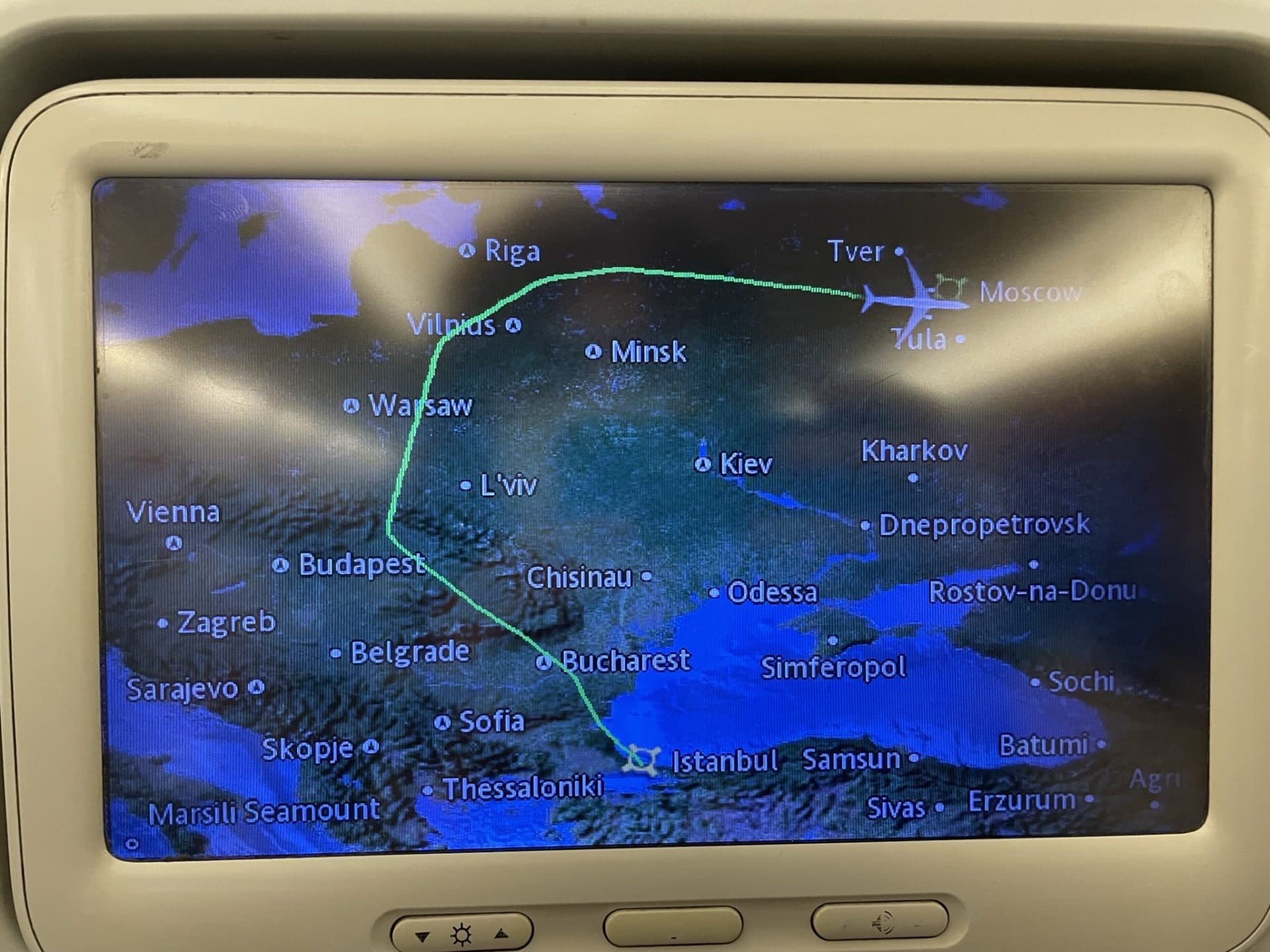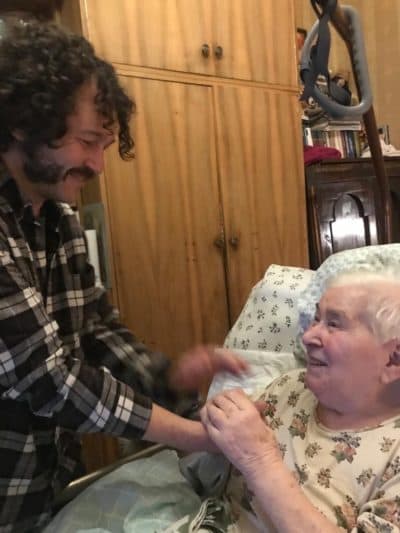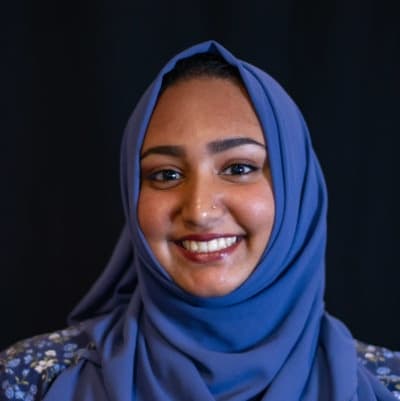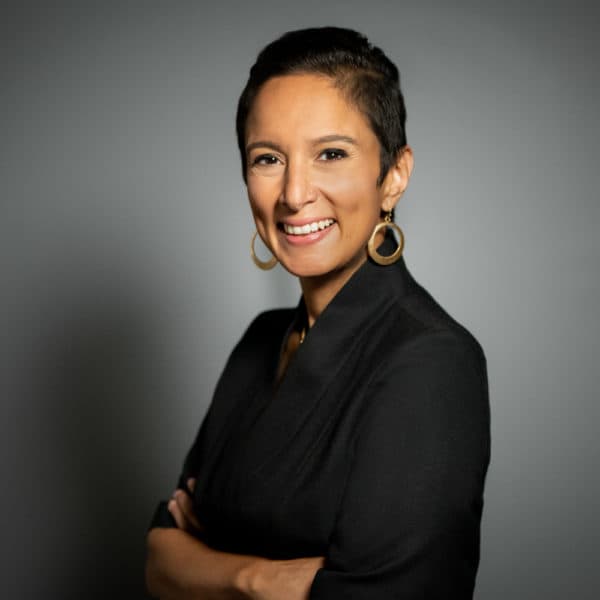Advertisement
A Russian living in Mass. is trying to get his grandmother home to the U.S.
Resume
When he heard his 94-year-old grandmother had awoken from her weekslong coma induced by contracting COVID-19, Yakov Kronrod left his home in Florence, Massachusetts, to rush to her aid.
The Russian American was aboard his connecting flight from Istanbul, Turkey, to his homeland in Moscow, when he noticed something odd on the tiny monitor screen depicting the flight path on the seat-back in front of him. His plane was foregoing the projected route of flying in a direct line to Moscow, instead easing circuitously around the entirety of Ukraine.
It was Feb. 24, the day Russia invaded Ukraine.
"We were flying in the completely wrong direction. That's when it really hit me, that there was a war unfolding below us, that all of a sudden we couldn't fly over the country, it was no longer safe," Kronrod said. "It was very eerie."

Kronrod had a return ticket to the U.S. for March 9, but stayed to take care of his recovering grandmother. With the help of some friends, he was able to secure a specialized wheelchair to accommodate someone who's normally bedridden. Now, he's trying to figure out a way to safely get her out of Russia and back to the U.S., where most of her family live, but he keeps running into obstacles.
"Waiting lines for family reunification for the U.S. are years. They're not doing emergency visas. The Moscow consulate is closed and we can't get any other consulate to consider her visa," Kronrod said. "So, even if she's ready to travel physically, we're not sure if we'll be able to bring her to Europe or to America."

Kronrod has other family in Russia, but many of them have already gotten out. His young male relatives, who would have been forced to serve in the army in Russia, left first. All those remaining are his grandmother, his sister and brother-in-law, who are involved with Memorial, a human rights organization, and are vocally dissident. Kronrod worries if the repressions in Russia get worse and something happens to them, his grandmother would be left with no one to care for her.
"I can't, in all good conscience, leave until I can leave with her," Kronrod said.
He's not alone in his attempts to leave Russia. As Putin widens his attacks on Ukrainian cities, there's news that thousands of Russians are fleeing their country amid the war. But Kronrod said these escaping Russians, often activists or otherwise dissident, are facing their own problems once they find safety due to the sanctions against Russia.
"They're not able to open bank accounts. Their credit cards don't work. People don't want to rent them places," Kronrod said. He's afraid these sanctions are going to force people to come back because they're being prevented from building any kind of life.
However, he said the sanctions are working, in a unique way, by forcing a national conversation in Russia about what's happening and its implications.
"[Many Russians] don't have access to real news from Ukraine, but they do see McDonald's [and] Starbucks closing. They do see the cars doubling in price overnight because no more will be delivered," he said. "We're slowly seeing the narrative deteriorate as people realize that there's no way the whole world hates all Russians. And that's critical right now because it forces people to pay attention."
The economy hasn't collapsed yet — though that may soon become a reality — and many Russians are not yet understanding the total economic impact of the war. But as the ruble continues to fall and when many Russians do not receive a paycheck at the end of March, in part due to the corporate exodus currently taking place, Kronrod said the reality will sink in.
"We're slowly seeing the narrative deteriorate as people realize that there's no way the whole world hates all Russians. And that's critical right now because it forces people to pay attention."
"When you get a couple of million people losing their jobs and missing their paychecks — with prices doubling on a lot of commodities and goods — I think at the end of March, we're going to see some devastation to the Russian economy in a way that right now, most Russians are not feeling it," he said.
The way Russians are perceiving the war also has to do with the information available to them. Unless Russians have access to Western media or know how to circumvent Putin's internet crackdown by installing virtual private networks (VPNs), they're fed government narratives from state television. There have been a slew of laws passed in the past few weeks that criminalize speech, dissent and even calling Russia's invasion a "war" in Ukraine.
Kronrod's family has experience with being threatened with persecution for dissenting. His grandfather, Aleksander Lavut, was well known for being a member of the Soviet Union’s first organized dissident group, and a key figure in the civil rights movement against the Soviet government. Some of Kronrod's earliest memories are visiting his grandfather in exile in Siberia, where he spent years shoveling coal in the gulag, Russia's infamous labor camp system.
Though he agrees Ukraine should receive all the help it can get, Kronrod hopes Americans and other countries help the Russians too.
"I think the reality is, unless something can change here in Russia, then history is doomed to keep repeating itself," he said. This change, Kronrod said, begins with getting information to Russians still in the country and helping activists spread that information. He advises supporting independent media organizations, such as Meduza, Novaya Gazeta or MediaZona.
This war is bringing back memories for Kronrod and his family, who emigrated to Europe as refugees from the Soviet Union in 1988 to flee political persecution. His parents applied for asylum and came to the U.S. in 1989, hoping to give him and three of his siblings a better life. Now, 33 years later, Kronrod, who once ran for Worcester City Council, finds himself back in his grandmother's apartment where he grew up, trying again to keep his family in Russia safe.
"This is crazy deja vu. Sitting in this same apartment, having the same conversation about getting our family to safety, leaving the country where we were born, leaving the country that we're proud to call home ... I never thought we would be in the same situation again."
This segment aired on March 16, 2022.

